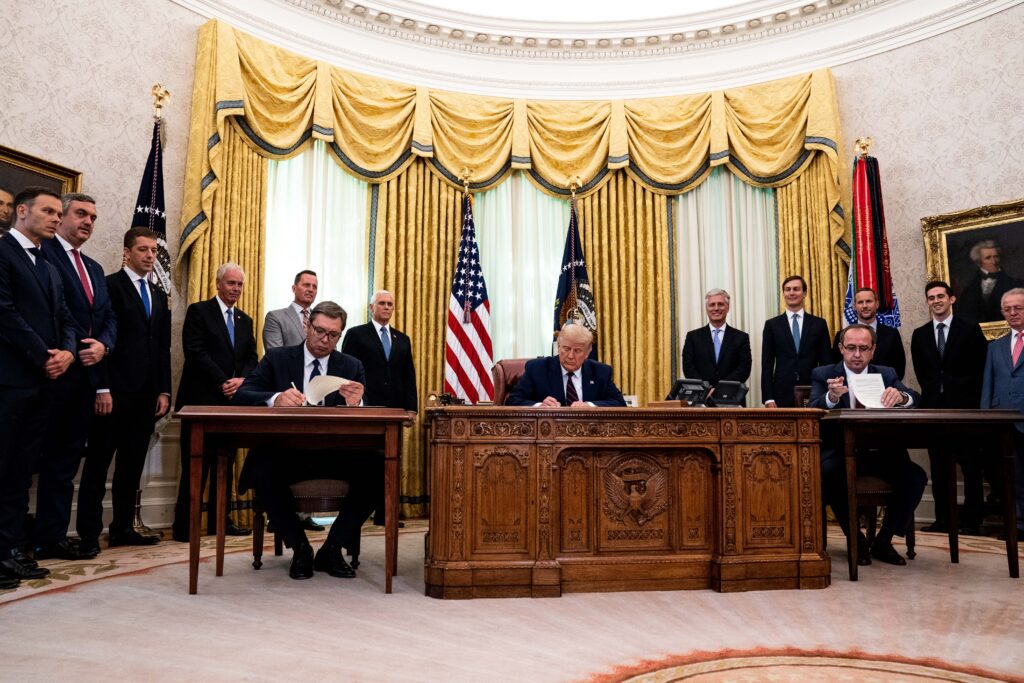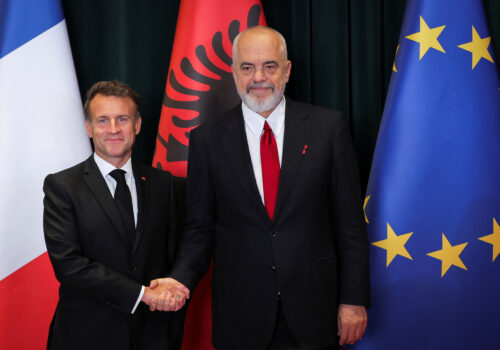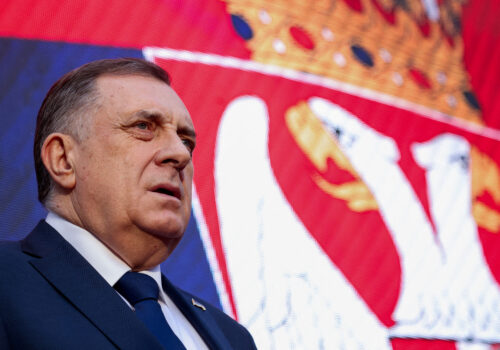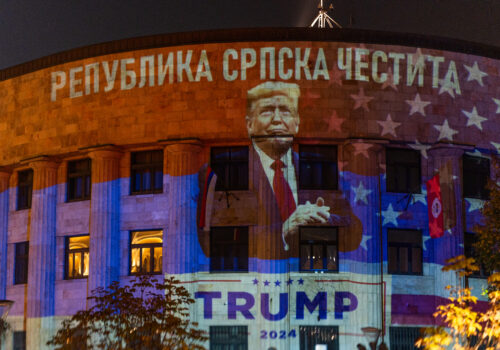
Over the past few months, US President Donald Trump has repeatedly referenced his past mediation between Kosovo and Serbia, praising an agreement reached between them during his first term and even claiming he prevented a war between the two countries earlier this year. These remarks raised eyebrows in the Balkans, since the region has recently not been a priority for either the United States or the European Union (EU). Does Trump’s sudden attention signal a renewed US focus on the region?
For now, Trump’s references to the Balkans appear more rhetorical than substantive. They are part of his larger effort to brand himself as a “peace president” and skilled dealmaker while also contrasting his policies with those of the Biden administration. This year, Trump has mentioned the Kosovo-Serbia issue only in passing, indicating that it is not central to his agenda.
At first glance, there are strong reasons to doubt that a major US diplomatic focus on the Balkans is on the horizon. The administration’s priorities lie elsewhere, and it has yet to settle on a coherent strategy toward Europe and Russia. Hawks and restrainers within the administration continue to clash over whether the United States should leave European security largely to Europe, with Ukraine at the center of that debate. The State Department has not even appointed an assistant secretary of state for European and Eurasian affairs.
On the other hand, the White House hosted a meeting this month between the leaders of Armenia and Azerbaijan, two recently warring states, where a peace pledge was signed in Trump’s presence. The administration may be looking to repeat this formula with other long-running disputes. If so, then it might naturally look to the Balkans, where the United States retains important assets and investments through NATO, and where some senior US officials have recently made inroads.
During a visit to Kosovo this month by US Deputy Assistant Secretary of Defense David A. Baker, Kosovo’s leaders noted that there were discussions on a joint US-Kosovo arms production program. The State Department has also reportedly confirmed that a $200 million Millennium Challenge Corporation (MCC) energy program in Kosovo will continue, even as the MCC was cut back substantially elsewhere. Also this month, US Secretary of State Marco Rubio hosted Serbian Foreign Minister Marko Djuric, launching a strategic bilateral dialogue and calling for de-escalation in Kosovo and Bosnia and Herzegovina.
There are clear reasons for continued US engagement in a region that it has helped shape for the past thirty-five years. Ongoing disputes in the Balkans provide Russia with opportunities to play spoiler in NATO’s neighborhood and fragment markets and trade routes that affect US investments. And importantly, demand for US involvement remains strong in the region—especially in Kosovo, where mistrust in the EU’s ability to manage major security challenges, such as Kosovo-Serbia relations, runs deep.
EU-led dialogue is at an impasse
Launched in 2011 with strong US backing, the EU-led dialogue between Kosovo and Serbia has been stalled for more than a year. The problem is not a lack of agreements, but rather an abundance of unimplemented ones.
In February 2023, the two sides agreed on a “path to normalizing relations.” The agreement implied Serbia’s de facto recognition of Kosovo by committing Belgrade to refraining from blocking Kosovo’s membership in international organizations and by accepting its documents, symbols, and institutions. In return, Kosovo pledged to establish an Association of Serb-Majority Municipalities to provide greater rights and autonomy for Kosovo Serbs. A month later, the sides endorsed an “implementation plan,” but a lack of agreement on the plan’s sequencing likely doomed the deal.
Distrust in each other’s intentions, skepticism toward Western guarantees, and the political rewards of ethnic brinkmanship pushed both sides toward unilateral moves in northern Kosovo. As Pristina dismantled Serbia’s illegal parallel governing structures, Serbian insurgents staged a failed armed incursion in late 2023, while most Kosovo Serbs abandoned Kosovo’s legal institutions. The outcome has been greater central government control over Kosovo’s north, but also greater ethnic segregation in the country and growing international isolation. The EU imposed restrictive economic measures on Kosovo in 2023, most of which remain in place. Serbia’s EU accession process has likewise been frozen.
Domestic politics have compounded the stalemate. Six months after inconclusive elections, Kosovo still lacks a new government with a mandate to negotiate. Meanwhile, Serbia has faced successive waves of student-led anti-corruption protests that have put its president, Aleksandar Vučić, on the defensive. Leadership changes in Washington and Europe have further limited Western attention.
The Trump administration could kickstart talks
In January, the EU appointed Danish diplomat Peter Sørensen as its new mediator in the Kosovo-Serbia dialogue, but he appears to lack the political backing needed for a fresh start. Brussels insists there is no alternative to the 2023 agreements, which it considers legally binding and has embedded into both countries’ EU accession frameworks. Yet the past two years have shown that accession—the EU’s main point of leverage—no longer carries weight in getting either side to comply.
Doubts appear to be growing in Kosovo, which is unrecognized by five EU member states, that the country has a realistic path to EU accession. Given this distrust, Kosovo leaders are unwilling to concede anything to Serbia for what it sees as an unattainable goal. In Serbia, the public and political elites alike appear to be growing increasingly disillusioned with the EU. Belgrade has effectively abandoned the accession process and has become largely unresponsive to EU pressure.
This deadlock may only be broken by an external jolt. Washington still holds decisive leverage over both parties. And the White House may have greater convening power than the EU, as demonstrated by this month’s Azerbaijan-Armenia talks. While the second Trump administration hasn’t demonstrated an interest in mediating Kosovo-Serbia talks thus far, it has proven unpredictable in its diplomatic initiatives. The Trump administration may, for example, eventually engage on this issue to seek a foreign policy “win” if progress on peace initiatives elsewhere prove elusive.
The challenge, however, is to avoid repeating past mistakes. If the United States renews its engagement on Kosovo-Serbia talks, it must aim for durable solutions rather than quick photo-ops. That requires complementing rather than competing with EU engagements, as well as pushing toward a final, legally binding agreement centered on mutual recognition—one that would allow Kosovo to fully consolidate its statehood and join (at least) Western multilateral institutions. Agreements that settle on anything less have proven to be fragile and unsustainable, merely pushing the can down the road to the next US administration.
Agon Maliqi is a nonresident senior fellow with the Atlantic Council’s Europe Center. He is a political and foreign policy analyst from Pristina, Kosovo.
***
The Western Balkans stands at the nexus of many of Europe’s critical challenges. Some, if not all, of the countries of the region may soon join the European Union and shape the bloc’s ability to become a more effective geopolitical player. At the same time, longstanding disputes in the region, coupled with institutional weaknesses, will continue to pose problems and present a security vulnerability for NATO that could be exploited by Russia or China. The region is also a transit route for westward migration, a source of critical raw materials, and an important node in energy and trade routes. The BalkansForward column will explore the key strategic dynamics in the region and how they intersect with broader European and transatlantic goals.
Further reading
Tue, Jun 17, 2025
Are Albania and Montenegro on the fast track to EU membership?
New Atlanticist By Agon Maliqi
Albania and Montenegro are capitalizing on the European Union’s renewed momentum for enlargement as a result of Russia’s war on Ukraine.
Wed, Apr 23, 2025
What’s at stake for Bosnia and Herzegovina as Milorad Dodik faces a political reckoning?
New Atlanticist By Agon Maliqi
With his secessionist threats seemingly at a dead end, Milorad Dodik’s external backers might view him as more of a liability than an asset.
Fri, Mar 7, 2025
What Trump’s approach to Europe means for the Western Balkans
New Atlanticist By
Shifts in US policy toward Europe could prompt the EU to step up on security for the Western Balkans and revive the enlargement process.
Image: President Donald Trump participates in a signing ceremony and trilateral meeting with the President of the Republic of Serbia, Aleksandar Vucic, and the Prime Minister of the Republic of Kosovo, Avdullah Hoti, at the White House on September 4, 2020. Sipa USA via Reuters Connect.



